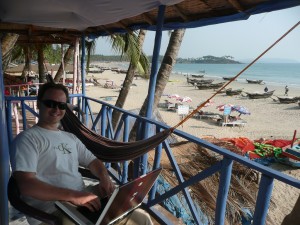BACK IN 2003, I left Ireland on this day with no return ticket, and 132 months / 574 weeks / over 4,000 days later, I’m still on the road with no home or place I can call a base. Everything I own in the world weighs 23kg/50lb and comes with me.
On my 8 year travel anniversary, I wrote my site’s most popular post ever by sharing the 29 most important life lessons I learned while travelling the world. And last year on my 10 year anniversary, I took those top-10 life lessons and presented them in a professionally-edited video to summarize my travels visually.
This year, I’m doing something different and sharing my most practical tips on how you can keep up long-term travel like I have, without winning the lottery (or having a mega savings). All throughout my travels — for over a decade — I’ve paid my way from money I earned while travelling.

 Before we discuss how to travel cheaper, it’s very important to tackle how to live cheaper. This applies to you right now, even while you are settled.
Before we discuss how to travel cheaper, it’s very important to tackle how to live cheaper. This applies to you right now, even while you are settled. When your general lifestyle is less expensive, the next biggest expense people imagine is flights.
When your general lifestyle is less expensive, the next biggest expense people imagine is flights. Most people think they have to save their pennies for months or years in advance until they have “enough” money to travel and live off of for a while. Unfortunately, this can only last you so long (unless you have won the lottery, in which case send a donation my way!). The fact is that you can earn while on the road.
Most people think they have to save their pennies for months or years in advance until they have “enough” money to travel and live off of for a while. Unfortunately, this can only last you so long (unless you have won the lottery, in which case send a donation my way!). The fact is that you can earn while on the road. The easiest way by far that English speakers can work abroad is to do it as an English teacher. In countries were English teachers are in high demand, the school will arrange the visa and all logistics for you.
The easiest way by far that English speakers can work abroad is to do it as an English teacher. In countries were English teachers are in high demand, the school will arrange the visa and all logistics for you. I worked on-location for my first years travel, but the catch was that my wages remained stagnant for all work other than teaching English, since I moved every few months and had to start over from scratch again.
I worked on-location for my first years travel, but the catch was that my wages remained stagnant for all work other than teaching English, since I moved every few months and had to start over from scratch again. The question of how you manage the logistics of working online is tricky because there are no international laws that govern such things. What many of us do is simply set ourselves up legally and officially in our home country – so we have a bank, and pay taxes there.
The question of how you manage the logistics of working online is tricky because there are no international laws that govern such things. What many of us do is simply set ourselves up legally and officially in our home country – so we have a bank, and pay taxes there.